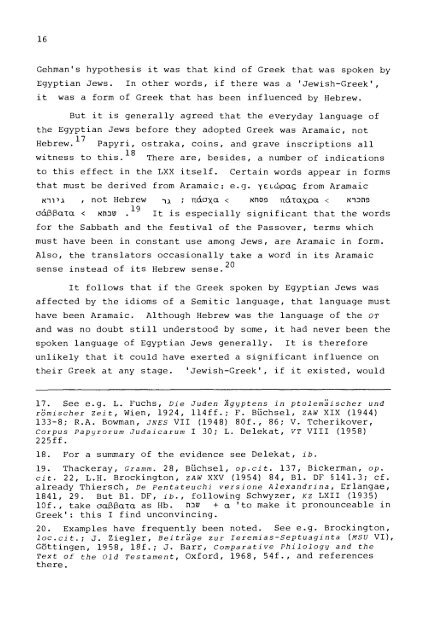A Lexical Study of the Septuagint Version of the Pentateuch
A Lexical Study of the Septuagint Version of the Pentateuch
A Lexical Study of the Septuagint Version of the Pentateuch
You also want an ePaper? Increase the reach of your titles
YUMPU automatically turns print PDFs into web optimized ePapers that Google loves.
Gehman's hypo<strong>the</strong>sis it was that kind <strong>of</strong> Greek that was spoken by<br />
Egyptian Jews. In o<strong>the</strong>r words, if <strong>the</strong>re was a 'Jewish-Greek',<br />
it was a form <strong>of</strong> Greek that has been influenced by Hebrew.<br />
But it is generally agreed that <strong>the</strong> everyday language <strong>of</strong><br />
<strong>the</strong> Egyptian Jews before <strong>the</strong>y adopted Greek was Aramaic, not<br />
Hebrew. Papyri, ostraka, coins, and grave inscriptions all<br />
18<br />
witness to this. There are, besides, a number <strong>of</strong> indications<br />
to this effect in <strong>the</strong> LXX itself. Certain words appear in forms<br />
that must be derived from Aramaic: e.g. γειώρας from Aramaic<br />
ÎOI>> , not Hebrew ; τιάσχα < κηοο πάταχρα < ίοοηο<br />
• 19<br />
σαββατα < Nroe> . It is especially significant that <strong>the</strong> words<br />
for <strong>the</strong> Sabbath and <strong>the</strong> festival <strong>of</strong> <strong>the</strong> Passover, terms which<br />
must have been in constant use among Jews, are Aramaic in form.<br />
Also, <strong>the</strong> translators occasionally take a word in its Aramaic<br />
20<br />
sense instead <strong>of</strong> its Hebrew sense.<br />
It follows that if <strong>the</strong> Greek spoken by Egyptian Jews was<br />
affected by <strong>the</strong> idioms <strong>of</strong> a Semitic language, that language must<br />
have been Aramaic. Although Hebrew was <strong>the</strong> language <strong>of</strong> <strong>the</strong> or<br />
and was no doubt still understood by some, it had never been <strong>the</strong><br />
spoken language <strong>of</strong> Egyptian Jews generally. It is <strong>the</strong>refore<br />
unlikely that it could have exerted a significant influence on<br />
<strong>the</strong>ir Greek at any stage. 'Jewish-Greek', if it existed, would<br />
17. See e.g. L. Fuchs, Die Juden Ägyptens in ptolemäischer und<br />
römischer Zeit, Wien, 1924, 114ff.; F. Büchsei, ZAW XIX (1944)<br />
133-8; R.A. Bowman, JNES VII (1948) 80f., 86; V. Tcherikover,<br />
Corpus Papyrorum Judaicarum I 30; L. Delekat, ντ VIII (1958)<br />
225ff.<br />
18. For a summary <strong>of</strong> <strong>the</strong> evidence see Delekat, ib.<br />
19. Thackeray, Gramm. 28, Büchsei, op.cit. 137, Bickerman, op.<br />
cit. 22, L.H. Brockington, ZAW XXV (1954) 84, Bl. DF §141.3; cf.<br />
already Thiersch, De <strong>Pentateuch</strong>i versione Alexandrina, Erlangae,<br />
1841, 29. But Bl. DF, ib., following Schwyzer, KZ LXII (1935)<br />
10f., take σαββατα as Hb. ma + α 'to make it pronounceable in<br />
Greek': this I find unconvincing.<br />
20. Examples have frequently been noted. See e.g. Brockington,<br />
loc.cit.; J. Ziegler, Beiträge zur Ieremias-<strong>Septuagint</strong>a {MSU VI),<br />
Göttingen, 1958, 18f.; J. Barr, Comparative Philology and <strong>the</strong><br />
Text <strong>of</strong> <strong>the</strong> old Testament, Oxford, 1968, 54f., and references<br />
<strong>the</strong>re.

















